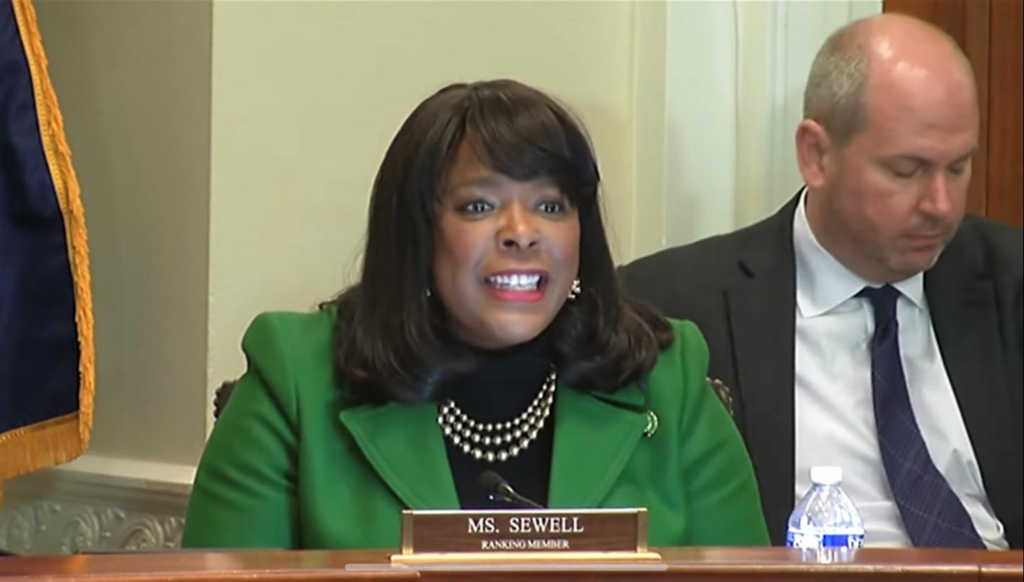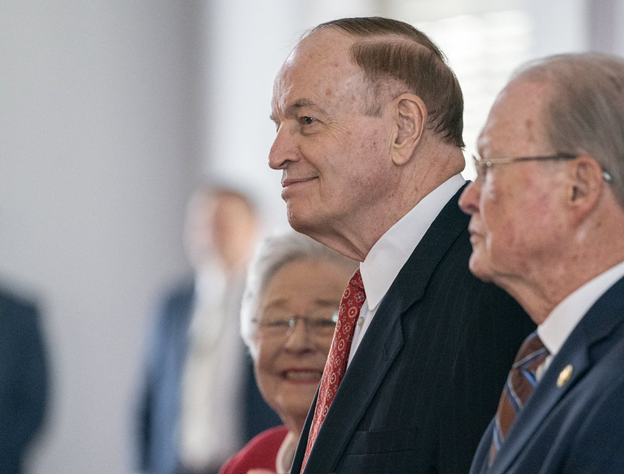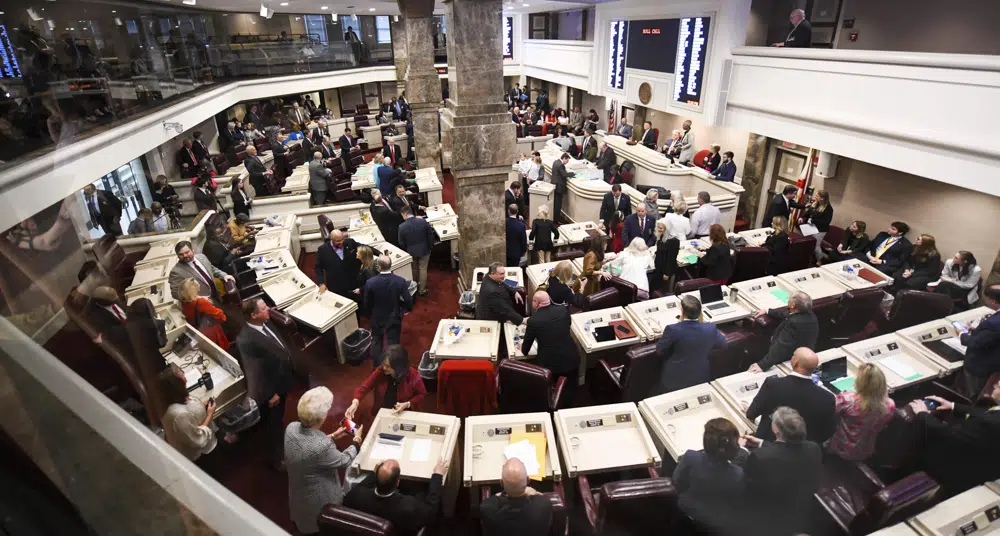Ron Desantis speaks to Alabama Republicans

Florida Governor Ron Desantis was in Hoover on Thursday to address the Alabama Republican Party. Over 1,400 attended the GOP’s winter dinner fundraiser to hear the likely presidential candidate denounce the “woke” movement. Desantis was welcomed by Alabama Gov. Kay Ivey, who introduced DeSantis, as well as other top state elected leaders. Attorney General Steve Marshall, Lieutenant Governor Will Ainsworth, Secretary of State Wes Allen, State Auditor Andrew Sorrell, Commissioner of Agriculture and Industries Commissioner Rick Pate, Chief Justice Tom Parker, Senate President Pro Tem Greg Reed, Speaker of the House Nathaniel Ledbetter, and many more were on hand at the Finley Center to welcome DeSantis to Alabama. “Tonight, I was proud to welcome @GovRonDeSantis to our Sweet Home Alabama!” Gov. Ivey said on Twitter. “I was honored to welcome “America’s Governor” @GovRonDeSantis to Alabama and lead the ALGOP dinner in the Pledge of Allegiance,” Lieutenant Gov. Ainsworth said on Twitter. Gov. DeSantis’s speech was heavy on social conservatism. DeSantis spoke about his feud with Disney, his opposition to books that preach alternate sexual lifestyles to children even in elementary school being in school libraries, his opposition to the COVID-19 economic shutdowns mask mandates, his anti-riot measures in Florida following the George Floyd riots, his shipping illegal aliens to Martha’s Vineyard, his opposition to the transgender agenda, and the migration of people from blue states like New York, Michigan, and California to red states like Florida. DeSantis said that Hispanics in Florida support his efforts to reduce illegal immigration to Florida. He also compared and contrasted his state of Florida with the state of New York. They have similar populations, but New York has twice the state budget. “What do they get for all that money?” DeSantis said. “We have no state income tax. Alabama should try that,” DeSantis said. While Florida has no income tax, their property taxes are far higher than Alabama’s, and as anyone who has driven around Florida knows, there are toll roads and toll collections all over the state outside of the federal interstate system, which are very rare in Alabama. Florida residents, on average, have a 9.1% state and local tax burden (#11 in the country), while Alabama residents pay 9.8% (#20 in the country.) Tennessee has the lowest tax burden in the southeast at 7.6% (#3 in the country). DeSantis spoke about his hurricane response and how fast his team built back a bridge to connect the residents of an island to the mainland. Desantis said that if he was President, his team could get the border wall built quickly and at reduced cost. DeSantis has not yet announced his presidential campaign. At this point, the only announced presidential candidates are former President Donald Trump and former South Carolina Governor and U.N. ambassador Nikki Haley. DeSantis and President Joe Biden are, at this point, presumed to be presidential candidates. DeSantis’s speech was the speech of a governor, touting his accomplishments as a governor. The most pressing issues facing the next President are Russia’s invasion of Ukraine, balancing the federal budget without crashing the economy, the possibility of war with China, the high likelihood of Iran obtaining nuclear weapons, the prospect of that triggering a war in the Middle East, as well as energy policy and its perceived connection to climate change. Desantis will have to discuss these larger issues in a presidential campaign. The Alabama Republican presidential primary is scheduled for March 5, 2024. To connect with the author of this story or to comment, email brandonmreporter@gmail.com.
Terri Sewell says that voting rights struggle continues today

Congresswoman Terri Sewell said that the voting rights struggle continues today. Sewell made her comments during a hearing of the Committee on House Administration Subcommittee on Elections, where she is the Ranking member. As Ranking Member, Sewell serves as the highest-ranking Democrat on the Subcommittee, which has jurisdiction over the administration of federal elections. “Providing oversight over federal election administration and ensuring every American has free and equitable access to the ballot is vital to our democracy,” Sewell said. “I represent Alabama’s Seventh Congressional District, a district with a long, storied history in this country’s struggle for free and fair access to the ballot. I am excited to join this Committee and continue this critical work.” “Last weekend, we marked the 58th anniversary of Bloody Sunday in my hometown of Selma with President [Joe] Biden, a bipartisan delegation of Members of Congress, civil rights leaders, and many of the surviving Foot Soldiers of the March from Selma to Montgomery,” Sewell said. “This annual pilgrimage serves as a reminder that the violent struggle for voting rights and equal access to the ballot is not one of the distant past. As we sit here today discussing the 2022 midterm elections, we must not lose sight of the fact that the struggle for equal voting rights that occurred on the Edmund Pettus Bridge 58 years ago continues today.” Many Republicans and supporters of former President Donald Trump question the results of the election, a narrative that Sewell rejected. “There were successes in the 2022 midterms, to be sure. Millions of Americans cast their ballots, those ballots were counted, and election workers across the country performed admirably despite the threats and harassment they have faced over the last two years,” Sewell said. “The election was secure, as it was in 2020. Those who continued perpetuating the Big Lie that the last presidential election was stolen and who traffic in falsehoods about the security of our elections lost many of their races for critical statewide offices.” Many states have passed election laws to improve the integrity of future elections following the 2020 controversy. These include voter ID laws, bans on ballot harvesting, bans on curbside voting, paper ballot requirements, advance voter registration, etc. Sewell rejected efforts to make voting more difficult. “Furthermore, according to the Brennan Center for Justice, in 2022, at least 12 states enacted laws that expand access to the vote,” Sewell continued. “On the opposite side of the spectrum, however, the Brennan Center found that another 12 states enacted restrictive or election interference legislation. We should applaud increases in voter turnout, not respond to them with new restrictions.” Many on the left claim that tightening voter integrity laws adversely impact minority communities. “Additionally, while many minority communities overcame barriers to cast their ballot – it does not make those barriers fair, and it certainly does not justify or validate their existence,” Sewell said. “In the years since the Supreme Court’s egregious decision in Shelby County v. Holder, states with a history of voter discrimination are no longer required to preclear their voting laws to ensure they are not discriminatory, allowing a wave of anti-voter laws to be adopted across the country. Today, the Supreme Court continues to dismantle the Voting Rights Act.” “I am proud to be the lead sponsor of the John R. Lewis Voting Rights Advancement Act, a bill that would update and reinstate the full force of the Voting Rights Act, a law that protected voters from discrimination for more than 50 years. Additionally, House Democrats have repeatedly passed pro-democracy legislation that would protect voters’ access to the ballot,” Sewell concluded. To connect with the author of this story or to comment, email brandonmreporter@gmail.com.
The State of Alabama honors Richard Shelby

On Thursday, both Houses of the Alabama Legislature joined Alabama Governor Kay Ivey for a joint legislative session to honor former U.S. Sen. Richard Shelby and his 52 years of service to the State of Alabama. Shelby represented State Senate District 16 from 1971 to 1979. In 1978, he was elected to Congress, representing Alabama’s Seventh Congressional District. He served four terms in the U.S. House of Representatives. In 1986 he was elected to the U.S. Senate. He spent the next 36 years serving the people of Alabama in the United States Senate. Shelby is a native of Birmingham and a graduate of the Birmingham School of Law, but it is Tuscaloosa where he launched his career. He was hired as city prosecutor for Tuscaloosa and became a special assistant attorney general before launching his political career as State Senator representing Tuscaloosa in the 1970 election. Every year Shelby was in the Senate, he introduced a flat tax and a balanced budget amendment—neither ever passed the Senate. The Legislature commended Shelby for his “Service to the state of Alabama and its citizens and wished him continued health and happiness in all future endeavors.” Ivey said, “We are here today, honoring a friend to all of Alabama. To Richard Shelby, I say welcome home. We are honored to have you back.” “He is the state’s longest-serving Senator at 36 years,” Ivey said. Ivey said that out of all the great senators the state of Alabama has had, they have been “eclipsed by Senator Shelby.” Ivey praised Shelby for having steered hundreds of millions of dollars in engineering and sciences funding to Alabama colleges and universities, as well as Redstone Arsenal, the Port of Mobile, and other projects across the state. “We wish you the best, and we proudly welcome you back to our sweet home Alabama,” Ivey concluded. Lieutenant Governor Will Ainsworth said Shelby “should be forever known as Alabama’s greatest builder.” “Perhaps the most important and lasting thing that Richard Shelby has built is his legacy,” Ainsworth said. “His legacy will be felt long after Richard Shelby and all who gather in this room have passed by generations of Alabamians not yet born.” Senate Pro Tem. Greg Reed said, “I echo everything that has been said eloquently by the Governor and Lieutenant Governor.” Speaker of the House Nathaniel Ledbetter said, “It is an honor and a privilege to honor a man in Senator Shelby who has dedicated his life to service of the people of Alabama.” Ledbetter thanked Shelby for the contribution that he has made to the development of the state. “Alabama’s economy is stronger than it has ever been,” Ledbetter said. “We have more jobs that we can ever fill. We look forward to building on the foundation that you have built in your 51 years of service.” State Sen. Jabo Waggoner praised Shelby, saying, “It appears that I am the only one in the Alabama Legislature still standing when he came to the Senate in 1971. I was elected in 1966, so I had a four year head start on Richard.” “He grew up on the west side of Birmingham like I did, but I did not know him until then,” Waggoner recalled. Every legislator today has an office in the Alabama Statehouse. In 1971 the Legislature still met in the historic 1859 State Capitol. “There were about five offices behind this (House) chamber,” Waggoner said. “For the rest of us, our office was this seat in this chamber, so we spent a lot of time together under the rotunda.” “When the history is written, what he has done in the House of Representatives and the Senate will put him right at the top,” Waggoner continued. “Everybody in Alabama knows the name Richard Shelby – everybody – and what he has accomplished for this state. When the history book is written, my friend, you will be right at the top.” Shelby said, “Today, I come back around to where I started 52 years ago. It is a great honor.” “I thought I was going to come down here and run things,” Shelby said. “After ten days, I realized I was going to have to work with people.” “We have come a long way,” Shelby said. Shelby said that he learned legislators can accomplish the most “if we work together to advance everybody.” To connect with the author of this story or to comment, email brandonmreporter@gmail.com.
Democrats seek repeal or exemptions in state abortion ban

Alabama’s abortion ban that took effect this summer allows no exemptions for pregnancies resulting from rape and incest. Democrats in the Alabama Legislature are seeking to change that but face impossible odds without some Republican support. Sen. Vivian Davis Figures, D-Mobile, filed legislation Tuesday to allow exemptions for rape and incest. Similar legislation is planned in the Alabama House of Representatives to repeal the ban or add exemptions. But Republicans hold lopsided majorities in both chambers, meaning the bills are doomed without garnering some GOP support. Figures told The Associated Press in a statement that a victim of rape and incest would again be traumatized “if she does not have a choice and she is forced to have a child that was fathered by a rapist or a family member via an incestuous act.” “Politicians have no business playing doctor or forcing a child to give birth by her rapist,” said Democratic Rep. Mary Moore of Birmingham agreed. “Politicians have no business playing doctor or forcing a child to give birth by her rapist,” she said. Alabama lawmakers in 2019 approved a near-total abortion ban, but it did not take effect until this summer when the U.S. Supreme Court overturned Roe. v. Wade, the decision that had guaranteed the nationwide right to an abortion. A federal judge soon after lifted the injunction that had blocked the Alabama ban. Some Republican lawmakers in 2019 described the strict ban as a legal strategy to challenge Roe as lawmakers in conservative states hoped to get the issue before a more conservative Supreme Court. Republican Rep. Terri Collins, the sponsor of the 2019 ban, said at the time that lawmakers could come back and write a new bill, and debate exemptions, if Roe was overturned. Collins told The Associated Press earlier this year that she wanted to have conversations with fellow Republicans to gauge if members want to keep the law as is or make changes. On Wednesday, Collins said that she was focused on her education bills at the moment. “I think it’s an issue that our members will bring forth on what they want to do,” House Speaker Nathaniel Ledbetter said Wednesday when asked about possible revisions to the abortion ban. Ledbetter noted that a majority of Alabama voters in 2018 voted to put anti-abortion language in the Alabama Constitution. The constitutional amendment saying Alabama recognizes “the rights of the unborn child” was approved by 59% of voters. “I feel good about where we’re at. We’re for life,” Ledbetter said, adding that lawmakers are working on bills to make adoption easier. Eric Johnston, an abortion opponent who helped write the 2019 ban, has argued that the constitutional amendment would prevent lawmakers from adding exceptions. Democrats argue that Republicans went too far with the ban. “It is time they understood that they made a crucial mistake. Women want access to safe abortions near them. … It should be their decision made with their doctor,” Figures wrote in a statement. Republished with the permission of The Associated Press.
Lawmakers advance plan for American Rescue Plan funds

Alabama lawmakers on Thursday advanced a spending plan to use the state’s final $1 billion in federal pandemic relief funds on water and sewer infrastructure, broadband expansion, health care reimbursements and other projects. The House Ways and Means General Fund Committee approved the legislation with one dissenting vote. It now moves to the full House of Representatives, where lawmakers plan to vote on it Tuesday. The sponsor of the bill, Republican Rep. Rex Reynolds of Huntsville, said he has multiple meetings with House members about the plan and is hoping for broad support during next week’s vote. “We need to get this passed and get it up to the Senate, and we’ll address any amendments that come up,” Reynolds said. Republican Rep. Arnold Mooney voted against the bill after saying he had some unanswered questions, including if lawmakers will have adequate oversight of the spending. Mooney said the Alabama Legislature is “constitutionally given the responsibility to appropriate funds and make sure that those funds are used in a correct manner.” The spending plan directs pots of money to state agencies, such as the Alabama Department of Environmental Management, and other entities to distribute for the allotted purposes. Reynolds said that lawmakers voted to create the Joint Legislative Oversight Committee on American Rescue Plan Act State Funds, which can request reports on expenditures. Alabama Gov. Kay Ivey called lawmakers into special session this week to address how to use the state’s remaining $1.06 billion from the American Rescue Plan Act — the sweeping $1.9 trillion relief plan approved by Congress to help the country climb out of the coronavirus crisis. The proposed spending plan would allocate: — $339 million for healthcare costs, including $100 million to reimburse hospitals for pandemic-related expenses, $100 million to reimburse nursing homes, and $25 million to support mental health programs and services. — $400 million for water and sewer infrastructure projects, including $195 million for high-need projects, $200 million for matching funds for public water and sewer systems, and $5 million for septic systems in the Black Belt region. — $260 million for improvement and expansion of broadband network access. — $55 million for projects that address economic impacts of the pandemic. The legislation says the Department of Finance may distribute the money for a wide range of needs, such as food banks, long-term housing, and summer learning programs for children. House and Senate committees on Thursday also advanced separate legislation to use $60 million from the current budget surplus to finish repaying money borrowed a decade ago during a budget shortfall. Alabama voters in 2012 approved borrowing $437 million from the Trust Fund — a state savings account fueled by offshore drilling royalties — to avoid cuts to state services. Republished with the permission of The Associated Press.
‘Alabama’s greatest builder’: State officials honor Richard Shelby

Gov. Kay Ivey and other state officials on Thursday paid tribute to former U.S. Sen. Richard Shelby, saying he transformed the economic and education landscape of the state during his decades of public service. Shelby, 88, retired this year after serving 36 years in the U.S. Senate in a career where he harnessed seniority, political savvy, and relationships to become one of the Senate’s most influential members. The Alabama Legislature met in a Thursday morning session held at the state Capitol to honor Shelby. “When we think of Alabama’s monumental U.S. senators, for many, Lister Hill, Jim Allen, and John Sparkman come to mind. While each was known for expertly navigating Washington politics to benefit our state, I think it’s fair to say their impacts have been rivaled and eclipsed by the work of Senator Shelby,” Ivey said. Lt. Gov. Will Ainsworth said Shelby forever changed Alabama by bringing projects for universities, government installations, infrastructure, and encouraging the development of aerospace and other industries in the state. “He should be forever known as Alabama’s greatest builder,” Ainsworth said, adding that the impact of Shelby’s work will be felt for generations. “Perhaps the most important and lasting thing that Richard Shelby has built is his legacy, a legacy that provides jobs, hope and opportunity to our children, our grandchildren, and their children after that for decades to come.” Shelby told the state leaders that it was “good to be home,” and said he always believed elected leaders should work together for the good of the people they represent. “It’s not about me. It’s about our state, the people, and the future of our state,” he said. The longtime senator announced in 2021 that he would not seek another term. Shelby was replaced in the Senate by his one-time chief of staff, Katie Britt, who was elected in November. Shelby, a lawyer and former member of the Alabama Legislature, was first elected as a conservative Democrat in 1978 to the U.S. House of Representatives during the party’s waning days of control in the Deep South. In the House, he belonged to a caucus of Southern conservatives known as the boll weevils. Shelby was elected to the Senate in 1986 but switched to the GOP in 1994. He became known for his measured demeanor and ability to harness his clout and relationships to direct billions of dollars in projects back to his home state of Alabama. He also had the rare accomplishment of chairing four major Senate committees — Appropriations; Intelligence; Banking, Housing, and Urban Affairs; and Rules and Administration. Republished with the permission of The Associated Press.


